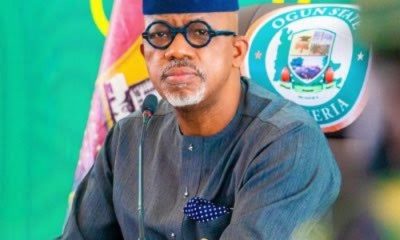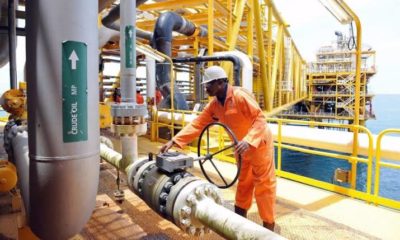Oil
2015: OPEC insist crude oil production wont drop, advice against panic

LAGOS-OPEC’s oil production is unlikely to change much in 2015 and there is no need to panic at the crude price drop, OPEC’s secretary general said yesterday, adding to indications the exporter group is in no hurry to cut output. Abdullah al-Badri also said output of higher-cost oil suppl
ies such as shale would be curbed if oil remained at around $85 a barrel, while the Organisation of the Petroleum Exporting Countries enjoys lower costs and will see higher demand for its crude in the longer term. Oil’s drop below the $100-mark, the level many OPEC members had endorsed, has raised the question of whether OPEC will cut supply when it meets in November.
Badri said OPEC’s output was unlikely to change much next year, adding to signs a decision to cut in November is unlikely. “I don’t think 2015 will be far away from 2014 in terms of production,” Badri told reporters in London at the annual Oil & Money conference. “There is nothing wrong with the market.” Brent crude LCOc1 has dropped more than a quarter from above $115 per barrel in June as abundant supplies of high-quality oil such as U.S.
shale have overwhelmed demand in many markets, filling stocks worldwide. But lower prices pose a threat to supply outside OPEC. While OPEC’s oil production costs are low, as much as half of shale output would be under threat if prices remain at current levels, Badri said.
“If prices stay at $85, we will see a lot of investment, a lot of oil, going out of the market,” he told the conference. “About 65 percent of the producers, they have high costs. Not OPEC.” Badri did not predict the outcome of OPEC’s meeting on Nov. 27, saying the decision was up to the group’s oil ministers, and appealed for calm over the decline in prices. “We do not see much change in the fundamentals. Demand is still growing, supply is also growing. OPEC is reviewing the situation,” he said.
The most important thing is we should not panic,” he said. “Unfortunately, everybody is panicking. We really need to sit, and think and see how this will develop. ”He dismissed suggestions that OPEC countries, in setting lower official selling prices for their crude oil, have embarked on a price war to preserve market share.
Badri declined to specify a level at which oil prices might find a floor, saying OPEC did not have a price target but would instead leave that to the market. “OPEC’s average price will still be $100 at the end of this year so we are fine for 2014,” he said. “The fundamentals do not reflect this low price.
OPEC does not have a price target. We must let the market settle down. ”Brent LCOc1 was trading around $87.30 by 10.30 a.m. EDT after reaching a four-year low of $82.60 two weeks ago. Badri said last month that he expected OPEC to lower its oil output target when it meets in Vienna, which would be its first formal output cut since the 2008 financial crisis.
OPEC has a production target of 30 million barrels per day (bpd) and Badri suggested last month that this should be cut to around 29.5 million bpd. Since then, OPEC members Iran and Kuwait have said a cut in output at the meeting was unlikely. Top producer Saudi Arabia has yet to comment publicly. Badri reiterated that supplies from rival producers, such as shale oil, were not a threat to OPEC long-term and said OPEC had to be ready to pump far more in future. “In the longer term, OPEC must be ready to produce. Around 2018-2020, U.S. tight oil will slow down,” he said. “By 2040, OPEC must be ready to produce 40 million bpd of oil, and 50 million bpd of liquids, that’s crude and natural gas liquids.”
Oil
NNPC Targets 60% Methane Emission Reduction By 2031
The Nigerian National Petroleum Company Limited (NNPC) has unveiled a bold strategy to reduce methane emissions in the oil and gas sector by 60% by 2031, with an ultimate goal of achieving net-zero emissions by 2060.
This announcement reinforces Nigeria’s leadership role under the Global Methane Pledge initiative and its commitment to tackling climate change.
The Group Chief Executive Officer of NNPC, Mele Kyari, disclosed these plans during a meeting on Thursday with Robert Leahman, the U.S. State Department’s Global Methane Program Manager, and a delegation from Deloitte.
READ MORE: Atiku Gloats Over AUN’s Achievements Ahead Of 20th Anniversary
The discussions, held at the NNPC Towers in Abuja, focused on collaborative efforts to reduce methane emissions through innovative and sustainable practices.
“Reducing methane emissions is not just an environmental necessity but also a strategic imperative for Nigeria’s energy transition. We are leveraging partnerships to adopt global best practices and innovative solutions,” Kyari stated.
Key among these efforts is a pilot project in the Niger Delta, aimed at establishing emissions baselines, mitigating methane leaks, and promoting sustainable operations across Nigeria’s energy sector.
The project, a partnership between NNPC, Deloitte, and the U.S. Bureau of Energy Resources, will utilize data-driven methodologies to pinpoint and address methane hotspots.
Robert Leahman commended Nigeria’s proactive stance, describing it as a benchmark for other nations on the continent.
“Nigeria’s leadership under the Global Methane Pledge sets a standard for the continent. These initiatives will not only help reduce emissions but also drive sustainable development in the energy sector,” he said.
Kyari highlighted the broader benefits of addressing methane emissions, noting its significance for both environmental protection and economic efficiency.
“This collaboration is a game-changer. By addressing methane leaks, we’re reducing waste, saving costs, and protecting the environment. It’s a win-win for our economy and the planet,” he added.
Oil
FG Introduces New Incentives To Revitalize Nigeria’s Oil & Gas Industry
In a strategic move to revitalize Nigeria’s oil and gas sector, the Federal Government has unveiled two key fiscal incentives aimed at attracting investment and enhancing energy security.
The announcement was made by Mr. Wale Edun, the Minister of Finance and Coordinating Minister of the Economy on Wednesday.
The first initiative, the Value Added Tax (VAT) Modification Order 2024, introduces critical exemptions for essential energy products and infrastructure, including Diesel, Feed Gas, Liquefied Petroleum Gas (LPG), Compressed Natural Gas (CNG), Electric Vehicles, Liquefied Natural Gas (LNG) infrastructure, and Clean Cooking Equipment.
Read Also: Atiku Calls For Rotational Presidency Across Nigeria’s Geopolitical Zones
These exemptions are designed to reduce living costs for Nigerians, promote energy security, and accelerate the transition to cleaner energy alternatives.
The second initiative, the Notice of Tax Incentives for Deep Offshore Oil & Gas Production, offers new tax relief options for deep offshore exploration projects.
This measure aims to position Nigeria’s deep offshore basin as a premier destination for international oil and gas investments, boosting the country’s appeal to foreign investors.
These reforms are part of a broader set of policy initiatives, known as Policy Directives 40-42, endorsed by President Bola Ahmed Tinubu.
The directives reflect the administration’s commitment to fostering sustainable development in the energy sector and enhancing Nigeria’s competitive edge in the global oil and gas market.
Business
Tinubu set to approve ExxonMobil-Seplat oil deal, expands CNG bus initiative

By Yemie Adeoye
NIGERIA’s President Bola Tinubu has announced that the protracted ExxonMobil-Seplat upstream oil divestment will be formally approved by the Minister of petroleum within a matter of days, just as he announced his government’s intention to expand the Compress natural Gas, CNG buses initiative.
The President who stated this during his Independence day nationwide broadcast stated that the move is in line with his administration’s commitment to free enterprise, free entry and free exit in investments which is the hallmark of his administration investment policy.
“Fellow compatriots, our administration is committed to free enterprise, free entry, and free exit in investments while maintaining the sanctity and efficacy of our regulatory processes. This principle guides the divestment transactions in our upstream petroleum sector, where we are committed to changing the fortune positively. As such, the ExxonMobil Seplat divestment will receive ministerial approval in a matter of days, having been concluded by the regulator, NUPRC, in line with the Petroleum Industry Act, PIA. This was done in the same manner as other qualified divestments approved in the sector.”
The President also seized the opportunity to plead with Nigerians to be patient with his administration’s reform policies. “As your President, I assure you that we are committed to finding sustainable solutions to alleviate the suffering of our citizens. Once again, I plead for your patience as the reforms we are implementing show positive signs, and we are beginning to see light at the end of the tunnel”.
“Our energy transition programme is on course. We are expanding the adoption of the Presidential Initiative on Compressed Natural Gas for mass transit with private sector players. The Federal Government is ready to assist the thirty-six States and FCT in acquiring CNG buses for cheaper public transportation.
Fellow Nigerians, while we are working to stabilise the economy and secure the country, we also seek to foster national unity and build social harmony and cohesion. Our economy can only thrive when there is peace”. he enthused.


























